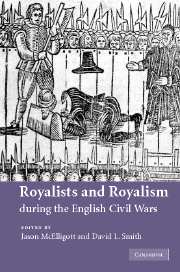Book contents
- Frontmatter
- Contents
- Notes on contributors
- Preface
- Abbreviations
- 1 Introduction: rethinking royalists and royalism
- 2 A lesson in loyalty: Charles I and the Short Parliament
- 3 The Court and the emergence of a royalist party
- 4 Varieties of royalism
- 5 Royalist reputations: the Cavalier ideal and the reality
- 6 Counsel and cabal in the king's party, 1642–1646
- 7 ‘I doe desire to be rightly vnderstood’: rhetorical strategies in the letters of Charles I
- 8 Royalists and the New Model Army in 1647: circumstance, principle and compromise
- 9 The royalist origins of the separation of powers
- 10 ‘A No-King, or a New’. Royalists and the succession, 1648–1649
- 11 The royalism of Andrew Marvell
- Subject Index
- Author Index
11 - The royalism of Andrew Marvell
Published online by Cambridge University Press: 19 July 2009
- Frontmatter
- Contents
- Notes on contributors
- Preface
- Abbreviations
- 1 Introduction: rethinking royalists and royalism
- 2 A lesson in loyalty: Charles I and the Short Parliament
- 3 The Court and the emergence of a royalist party
- 4 Varieties of royalism
- 5 Royalist reputations: the Cavalier ideal and the reality
- 6 Counsel and cabal in the king's party, 1642–1646
- 7 ‘I doe desire to be rightly vnderstood’: rhetorical strategies in the letters of Charles I
- 8 Royalists and the New Model Army in 1647: circumstance, principle and compromise
- 9 The royalist origins of the separation of powers
- 10 ‘A No-King, or a New’. Royalists and the succession, 1648–1649
- 11 The royalism of Andrew Marvell
- Subject Index
- Author Index
Summary
In the England of the 1640s, civil war was fought on two fronts: by the sword, and by the pen. The polemicist Marchamont Nedham, a figure with a large part in Andrew Marvell's literary career, remarked in 1652 that ‘in our late wars … the pen militant hath had as sharp encounters as the sword, and borne away as many trophies’. For while the sword may subdue men ‘by force’, ‘the pen it is which manifests the right of things; and when it is once cleared, it gives spurs to resolution, because men are never raised to so high a pitch of action, as when they are persuaded, that they engage in a righteous cause’. In the late 1640s, when the story to be told in this chapter begins, the pen was the principal instrument of defeated royalism, the cause which Nedham, the serial turncoat of the Puritan Revolution, served at that time. During the Second Civil War of 1648, it is true, it was briefly the ally and servant of the sword, but otherwise it was a substitute for it. Never was royalism more buoyant on the page than in the two years that preceded the execution of the king. The royalist cause, like the parliamentarian one, had always been a coalition of principles and temperaments. Royalist writing ranged from piety to hedonism, from Calvinism to paganism, from belligerence to Stoic resignation, from divine-right absolutism to moderate constitutionalism, from unquestioning commitment to the king to doubts about his conduct and policies.
- Type
- Chapter
- Information
- Royalists and Royalism during the English Civil Wars , pp. 214 - 238Publisher: Cambridge University PressPrint publication year: 2007



